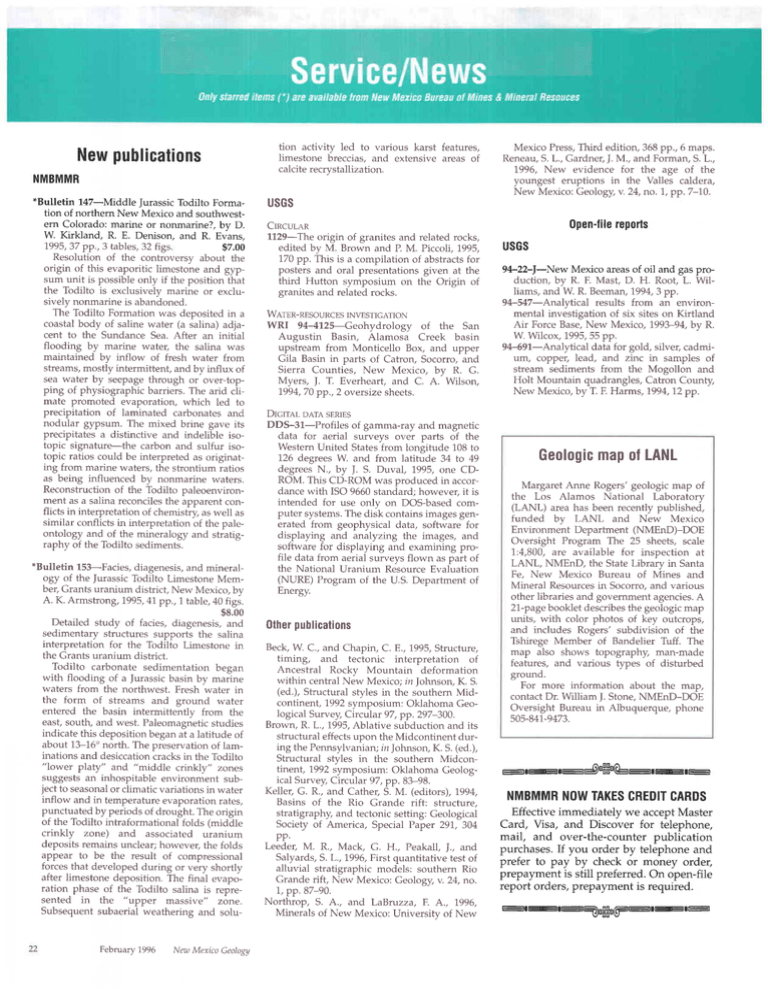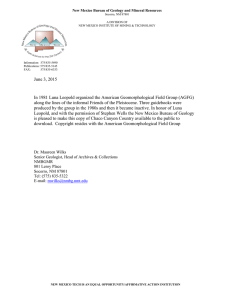publications New
advertisement

Newpublications NMBMMR *Bulletin l47-Middle Jurassic Todilto Formation of northern New Mexico and southwestern Colorado: marine or nonmarine?, bv D. W. Kirkland, R. E. Denison, and R. Evans, 1995,37pp,3 tables,32figs $7.00 Resolution of the controversv about the origin of this evaporitic limestone and gypsum unit is possible only if the position that the Todilto is exclusively marine or exclusively nonmarine is abandoned. The Todilto Formation was deposited in a coastal body of saline water (a salina) adjacent to the Sundance Sea. After an initial flooding by marine water, the salina was maintained by inflow of fresh water from streams, mostly intermittent, and by influx of sea water by seepage through or over-topping of physiographic barriers. The arid climate promoted evaporation, which led to precipitation of laminated carbonates and nodular g)?sum. The mixed brine gave its precipitates a distinctive and indelible isotopic signature-the carbon and sulfur isotopic ratios could be interpreted as originating from marine waters, the strontium ratios as being influenced by nonmarine waters. Reconstruction of the Todilto paleoenvironment as a salina reconciles the ipparent conflicts in interpretation of chemistry, as well as similar conflicts in interpretation of the paleontology and of the mineralogy and stratigraphy of the Todilto sediments. *Bulletin 1S3-Facies, diagenesis, and mineralogy of the Jurassic Todilto Limestone Member, Grants uranium district, New Mexico, bv A. K. Armstron g, 1995, 41.pp., 7 table, 40 figi. $8.00 Detailed study of facies, diagenesis, and sedimentary structures supports the salina interpretation for the Todilto Limestone in the Grants uranium district. Todilto carbonate sedimentation began with flooding of a Jurassic basin by marine waters from the northwest. Fresh water in the form of streams and qround water entered the basin intermittently from the east, south, and west. Paleomagnetic studies indicate this deposition began at a latitude of about 13-16'north. The preservation of laminations and desiccation cracks in the Todilto "Iower platy" and "middle crinkly" zones suggests an inhospitable environment subject to seasonal or climatic variations in water inJlow and in temperature evaporation rates, punctuated by periods of drought. The origin of the Todilto intraformational folds (middle crinkly zone) and associated uranium deposits remains unclear; however, the folds appear to be the result of compressional forces that developed during or very shortly after limestone deposition. The final evaporation phase of the Todilto salina is represented in the "upper massive" zone. Subsequent subaerial weathering and solu- February'1996 New Mexico Geology tion activity led to various karst features, limestone breccias, and extensive areas of calcite recrystallization Mexico Press, Third edition, 368 pp.,6 maps. Reneau, S. L., Gardner, J. M., and Forman, S L., 1.996, New evidence for the age of the youngest eruptions in the Valles caldera, New Mexico: Geology, v. 24, no. 7, pp.7-70. USGS reports 0pen-file Cnculan 1129-The origin of granites and related rocks, edited by M Brown and P. M Piccoli, 1995, 170 pp. This is a compilation of abstracts for posters and oral presentations given at the third Hutton symposium on the Origin of granites and related rocks. Warrn-nrsouncEs rNVEsrrcATroN g4-Al2s-Geohydrology WRI of the San Augustin Basin, Alamosa Creek basin upstream from Monticello Box, and upper Gila Basin in parts of Catron, Socorro, and Sierra Counties, New Mexico, by R. G. Myers, |. T. Everheart, and C A. Wilson, 7994,70 pp.,2 oversize sheets. Dtcnel DATAsERIES DDS-3l-Profiles of gamma-ray and magnetic data for aerial surveys over parts of the Western United States from longitude 108 to 126 deerees W. and from latitude 34 to 49 degreeJ N., by l. S. Duval, 1995, one CDROM. This CD-ROM was produced in accordance with ISO 9660 standard; however. it is intended for use only on DOS-based computer systems. The disk contains images generated from geophysical data, software for displaying and analyzing the images, and software for displaying and examining profile data from aerial survevs flown as part of the National Uranium Resource Evaluation (NURE) Program of the U S Department of Energy. publications Other Beck, W. C , and Chapin , C. E., 1995, Structure, timing, and tectonic interpretation of Ancestral Rocky Mountain deformation within central New Mexico; ln Johnson, K S (ed ), Structural styles in the southern Midcontinent, 1992 svmposium: Oklahoma Geological Survey, Circular 97, pp. 297-300. Brown, R. L.,1995, Ablative subduction and its structural effects upon the Midcontinent during the Pennsylvanian; ln Johnson, K. S. (ed.), Structural styles in the southern MidconIinent, 1992 symposium: Oklahoma Geological Survey, Circular 97, pp. 83-98. Keller, G. R., and Cather, S. M. (editors), 1994, Basins of the Rio Grande rift: structure, stratigraphy, and tectonic setting: Geological Society of America, Special Paper 291,, 304 pP. Leeder, M. R., Mack, G. H., Peakall,1., and Salyards, S. L , 1996, First quantitative test of alluvial stratigraphic models: southern Rio Grande rift, New Mexico: Geology, v.24, no. I, pp.87-90. Northrop, S. A., and LaBnnza, F. A., 1996, Minerals of New Mexico: University of New USGS 94--22-|-New Mexico areas of oil and gas pro- duction, by R. F. Mast, D. H. Root, L. Williams, and W. R. Beeman,7994,3 pp. 94-S47-Analytical results from an environmental investigation of six sites on Kirtland Air Force Base,New Mexico, 7993-94,by R. W. Wilcox, 1995,55pp 94-59l-Analytical data for gold, silver, cadmium, copper, lead, and zinc in samples of stream sediments from the Mogollon and Holt Mountain quadrangles,Catron County, New Mexico, by T. F. Harms, 7994,12 pp. mapol LANL Geologic Margaret Anne Rogers' geologic map of the Los Alamos National Laboratory (LANL) area has been recently published, funded by LANL and New Mexico Environment Department (NMEnD)-DOE Oversight Program The 25 sheets, scale 7:4,800, are available for inspection at LANL, NMEnD, the State Library in Santa Fe, New Mexico Bureau of Mines and Mineral Resources in Socorro, and various other libraries and govemment agencies. A 21-page booklet describes the geologic map units, with color photos of key outcrops, and includes Rogers' subdivision of the Tshirege Member of Bandelier Tuff. The map also shows topography, man-made features, and various tlpes of disturbed grouno. For more information about the map, contact Dr. William J. Stone, NMEnD-DOE Oversight Bureau in Albuquerque, phone 505-841.-9473. :)r=€r:4Q0fr flo@-rE-rr:t NMBMMR NOWTAKES CREDIT CARDS Effective immediately we acceptMaster Card, Visa, and Discover for telephone, mail, and over-the-counter publication purchases.If you order by telephone and prefer to pay by check or money order, prepayment is still preferred. On open-file report orders, prepayment is required. :'r-r:rQrB016=:r@r: =ll-Xt-,ll-Xl€}t|e Geographic Names U.S.Board onGeographic Names Barker, Mount-summit, elevation 3,488 m (77,445 ft), in Santa Fe National Forest (San Miguel), in the southern Sangre de Cristo Mountain Range, 1.6 km (1 mi) southwest of Elk Mountain, named for Elliott Speer Barker (1889-1989),Squire Omar Barker (1894-1985), and other Barker family members who made significant contributions to the State of New Mexico; San Miguei County, NM; sec. 28 T18N R13E, Cila and Salt River Mer.; 35'45'48"N, 705"34'09"W; USCS map, E1k Mountain 7:24,000 Capulin, Rio-stream, 10.3 km (6.4 mi) 1ong, in t h e P e c o sW i l d e r n e s s i n t h e S a n t a F e N a t i o n a t Forest, heads at 35'50'46"N, 705"45'79"W, flows northwest 4 8 km (3 mi) then southwest to Rio Nambe 5 8 km (3 6 mi) northwest of Aspen Peak; Santa Fe County, NM; sec 26 T19N R10E NMPM; 35'50'37"N, 105'50'49"W; USGS map, Aspen Basin 1.:24,000 Lower West Side Santo Domingo Ditchcanal, 5.3 km (3 3 mi) long, south end at the Rio Grande (35'32'28"N, 706' 27'46"1N ), north end at Sile Main Canal (35'34'56"N. 1,06"22'08"W),north end 32km (2 mi) northwest of Pefra Blanca; Sandoval County, NM; sec. 1, T15N RsE NMPM; 35'33'46"N, 1.06"27'52"W [center]; USGS map, Santo Domingo Pueblo I :24,000. North Fork Walnut Creek-stream. 8.9 km (5 5 mi) long, in Gila National Forest, heads at 32"51,'46"N, 708"07'04"W, flows northwest to Walnut Creek2.7 km (1 7 ml) west-southwest of Juniper Hill; Crant County, NM; sec 26 T15S R15W NMPM; 32"53'03"N, 1,0822'09"W; USCS map, Reading Mountain 7:24,000; nof: Walnut Creek, Little Walnut Creek Redonda, Cienega-swamp, in the Pecos Wilderness in Santa Fe National Forest, on the south slope of Sierra Mosca, 10 km (6.2 mi) southeast of Mesa Borrego; Santa Fe County, NM; 35'54'31"N, 105'46'00"W; USGS map, S i e r r a M o s c a 1 : 2 4 , 0 0 0n; o f : C i e n a g a R e d o n d i Remora, Agua-stream,4.5 km (2 8 mi) 1ong, in C i b o l a N a t i o n a l F o r e s t ,h e a d s a t 3 5 ' 2 0 ' 1 0 " N , 708"28'54"W and flows southwest to join Thmpico Draw,7 km (4 4 mi) northeast of the community of Upper Nutria; McKinley County, NM; secs 25,26, 27, and 34 T13N Rl6W, New Mexico Mer.; 35"19'00"N, 708"37'72"1N; USGS map, Upper Nutria 7:24,000; not: Ojo Pescadillo, Radosevich Creek Santo Dorningo West Side Drain-canal, 89 km (5.5 mi) long, southwest end at the Rio Crande (35'28'56"N, 106'24'07W), northeast end at Santo Domingo Ditch (35"32'16"N, 706"22'06"W), southwest end 6 4 km (4 mi) northeast of San Felipe Pueblo; Sandoval County, NM; sec 22 T15N RSE NMPM; 35"30'53"N, 1,06'23'30"W Icenter]; USGS map, S a n t o D o m i n g o P u e b l o S W l : 2 4 , 0 0 0( c e n t e ro f feature); ztof:Lower West Side Santo Domingo Ditch. geologic meetings Upcoming Contact for more information Conference title Dates Location Tucson Gem & Mineral Society Show Feb.8-11 Convention Center Tucson, AZ TGMS Show Comm. P.O.Box 42543 Tucson,AZ 85733 Phone (520)322-5773 Fax (520) 322-6037 Albuquerque Gem & Mineral Show Mar 2-3 UNM Continuing Education Center Albuquerque, NM Albuquerque Gem & Mineral Club Phone (505) 822-9352 Minerals of Arizona, fourth annual symposium Mar.23 AZ Mining & Mineral Museum Phoenix, AZ Mineral Museum 15th & Washington Phoenix, AZ Phone (602) 255-3791, Platform carbonates in the southern Midcontinent Mar.26-27 Norman, OK K. S. johnson Okla. Geol Survey 100E. Boyd, Rm .N-133 Norman, OK 73019 Phone (405) 325-3037 Fax (405)325-7069 New Mexico Geological Society spring meeting .A' rn ^r ' ^ 1- ) Macey Center Socorro, NM Matt Heizler NMBMMR Socorro,NM 87801-4796 Phone (505)835-5244 email matt@gis.nmt.edu 'A- rn_r ' -?"R - Edmonton Convention Center Edmonton, Alberta Ian Muirhead c/o Univ of Alberta 606 CME Bldg. Edmonton, Alberta, Can. Phone (403) 492-381,0 Fax (403) 492-3409 email ianm@cominco mineral.ualberta.ca CIM AGM '96 Edmonton: 98th annual meeting May 2 AAPG/SEPM annual meeting May 7912 San Diego, CA John A. Minch 26461Crown Valley Pkw Suite 200 Mission Viejo, CA92691 Phone (714)367-7000 Rocky Mountain Federation Show & Convention June 7-9 Yucca Center Roswell, NM Howell T. Whiting Chaparral Rockhounds 2300S. Union Roswell, NM 88201 Phone (505)622-5679 AAPG Rocky Mountain Section meeting lrly 28-37 Billings, MT BetsyCampen 7314Charolais St Billings, MT 59106 Phone (406)652-7760 Thirty, Tank-reservoir, 183 m (600 ft) long, in Santa Fe National Forest, between Cerro Rito (summit) and Twin Hills, 5 6 km (3 5 mi) southeast of Montoso Peak; Santa Fe County, NM; 35'42'15"N, 106"09'56"W; USGS map, Montoso Peak 1:24,000;nof: Rito Reservoir. Valle Alto-area, elevation 3,450 m (11,320 ft) in Santa Fe National Forest, 41 m (135 ft) below an unnamed feature (summit) 3,491 m (11,455 ft) proposed to be named Mount Barker in part of the southern Sangre de Cristo Mountain Range, 1.9 km (1.2 mi) southwest of Elk Mountain, in local use for over 100 years, name is of Spanish origin and means "high valley"; San Miguel County, NM; sec. 28 T18N R13E, Gila and Salt River Mer.; 35'45'41"N, 1,05"34'74"\N; USGS map, Elk Mountain. -David NMBMMR =il-xffi NewMexicoCeology February 1996 W. Love Correspondent NonPfolt 0rgantrarion US Postage P AI D SOCORBO, NTWMEXICO P T B MNI O T9




